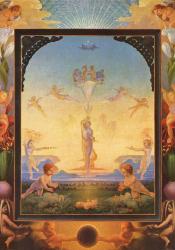Romanticism
Romanticism began in the late 18th century, arguably as an important revolutionary movement as a response to the French Industrial Revolution and the Enlightenment. This led Romanticism to be seen as the Revolution form of poetry as a call for reform and revolutionary. Romantic writers and poets had the theme of changing the view of nature, instead of focusing on the rigid development of industry. They believe that the beauty of nature is also the beauty of the human soul. They want to be in harmony with nature, looking for the grandeur that nature has. Besides the tranquil beauty of nature, there are also unpredictable and uncontrollable factors, such as terrible storms, thunder, volcanic eruptions, etc. Feelings of awe at those phenomena help writers and poets to sense and feel the supernatural things, the Sublimes, thereby stimulating their adventurousness, curiosity and imagination. In Mary Shelley's Frankenstein, many elements of Romanticism can be found. From the imaginatively inspired idea of being able to bring a dead creature back to life, to the creature's first feelings and senses about nature and its desire for equality it should have been received.
MLA Works Cited Entry
Metmuseum.org, https://www.metmuseum.org/toah/hd/roma/hd_roma.htm.
“Romanticism.” Wikipedia, Wikimedia Foundation, 5 Dec. 2021, https://en.wikipedia.org/wiki/Romanticism.

